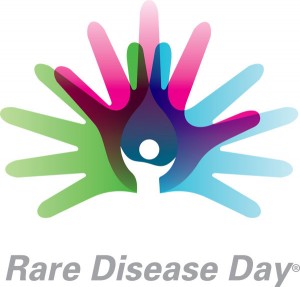
The last day of February marks the ninth annual Global Rare Disease Day. Its goal is to raise awareness for diseases that are almost unknown to the general public, since they only affect a limited number of individuals, but the importance of this day goes beyond the goal of just gaining attention. Rare disease day is organized so that policy and research can turn their attention to disorders that lie outside general knowledge; this in the hope that, in the near future, some of these diseases might be cured, or, in some cases, that policy might change to improve the lives of some of the individuals suffering from these distinct ailments.
The organization in charge of raising awareness for this day (Eurordis) defines a rare disease as one that affects fewer individuals than 1 in 2000 in Europe and fewer than 1 in 200,000 in the US. So far, they recognize over 6000 rare diseases, each bringing its own challenges to the patients suffering from these. One of the challenges faced is the mere diagnosis of the disease, since its rarity makes it difficult for doctors to detect early on.
One such rare disease that’s often difficult to diagnose is male breast cancer. Male breast cancer is usually detected in males 60 to 70, and makes up 1% of all breast cancer cases. The risk of this disease occurring is usually increased by high estrogen levels, radiation exposure, and family history of breast cancer. Initial diagnosis of it is done through the checking of lumps on the patient’s breasts. Because the disease is fundamentally the same as all breast cancer, research for the treatment and prevention of this disease is similar for both men and women. Currently there are several foundations that raise money for breast cancer research, such as the Susan G Komen Foundation and the National Breast Cancer Foundation. However, what makes male breast cancer a rare disease is its difficulty in diagnosing patients because of lack of awareness, and the low percentage of men who suffer from this disease. The Lovely Patient (distributed by World Wide Motion Pictures) is a film that depicts a character who suffers from this rare ailment (Frank Hartsfield, played by John Collier). The film tells the story of Leonard Marshall (played by John Glenn) who loses his job, but quickly has to find another job in order to provide for his mother. He finds an opening to be a driver, and in this job he befriends Frank Hartsfield, who becomes a father figure to Leonard. Their relationship puts into the screen a depiction of those suffering from the rare illness, and in this way it brings awareness to the disease, while one dramatic string envelops how those around them are affected by it. To learn more about this day, or to see how you can help, visit www.rarediseaseday.org.





